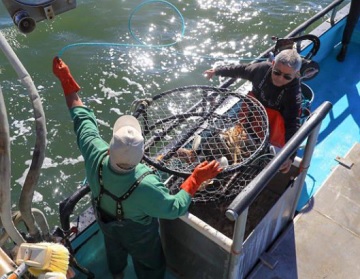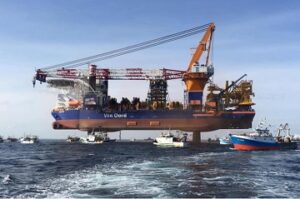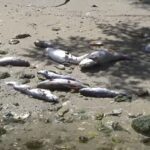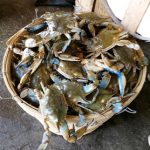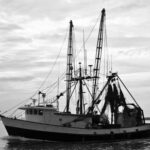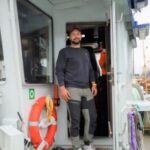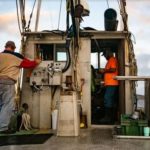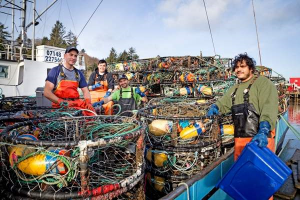Tag Archives: Ben Platt
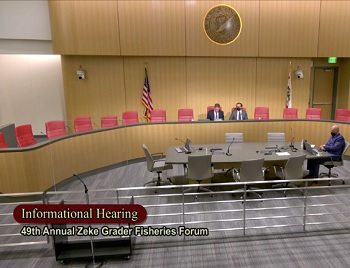
‘A healthy ocean means a healthy fleet’: salmon, crab, kelp, and climate the focus of annual fisheries forum
Dispatches on the state of California’s fisheries this year have brought “a mix of some glimmers of better news, while still struggling with difficult issues,” California Department of Fish and Wildlife (CDFW) Director Chuck Bonham summarized at the 49th Annual Zeke Grader Fisheries Forum on Wednesday afternoon. The forum was moderated by State Senator Mike McGuire as part of the Joint Committee on Fisheries and Aquaculture. In addition to a detailed report from Bonham, the afternoon featured panels on drought and salmon, the dungeness crab season, the state of California’s kelp forests, and aquaculture — as well as a brief public comment period. >click to read< 19:16
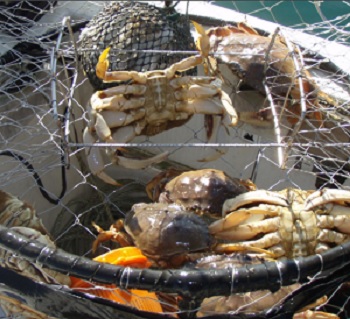
California Crab Groups Oppose Legislation Requiring ‘Ropeless’ Gear
The crabbing season has been repeatedly delayed by state agencies citing concerns about whale sightings,,, The most recent industry challenge comes in the form of proposed legislation which would require crabbers and many other fishermen to use “ropeless” traps by the end of 2025 in order to avoid killing or harming sea creatures which can become snared in lines stretching from a trap at the sea-floor to a buoy at the surface. In a recent press release, Ben Platt, president of the California Coast Crab Association, an industry group formed last year, says AB 534 “promotes an unproven and unviable fishing method that presents significant operational and safety risks to West Coast fisheries.” >click to read< 08:13
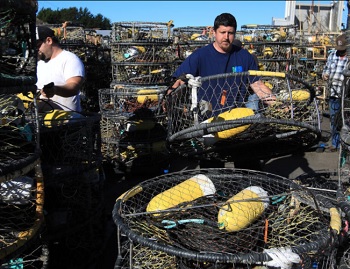
Price strike drags on for California crab fleet holding out for better price
“We can’t afford to do these operations with the price they’re offering. We go backward,” said Ben Platt, president of the California Coast Crab Association. “That’s why everyone’s holding together, holding strong. We were starting at $3 a pound 10 years ago, and our costs have definitely gone up.” The additional two bits that crabbers are seeking before they’ll be wiling to leave dockside makes an enormous difference when multiplied by thousands of pounds.,, Veteran Bodega Bay crabber Tony Anello, part of a family long tied to the industry. “You’re not going to be able to keep your crew long, because you can’t sustain them. >click to read< 09:01
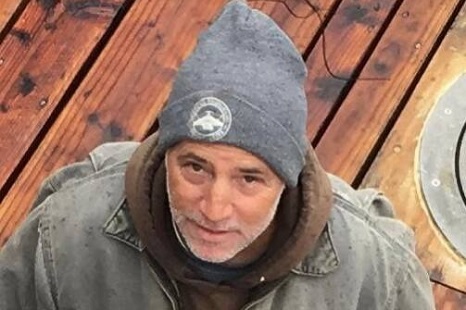
Ben Platt: Whales aren’t at risk from crab fishing along California’s coast
Anyone who lives in or near California’s many historic fishing communities like Morro Bay, Monterey, or Half Moon Bay, has probably heard the term “ropeless” crab fishing gear. That’s the new buzzword for equipment being promoted by environmental groups to solve the perceived problem of whale interactions with fishing gear.,,, Both the East Coast Lobster fishery and the West Coast Dungeness crab fishery, each of which are made up of thousands of independent fishermen, have tested the pop-up “ropeless” gear and found it to be faulty. Meanwhile, strikes by large ships likely cause 50-150 whale deaths a year off the West Coast,,, >click to read< 07:31
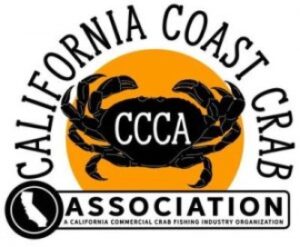
Extended Closure of CA Dungeness Crab Fishing Season Will Hurt Working Families, Eliminate Holiday Crab Traditions
“Since mid-November, fishermen have had to sit idle at the dock and accept delays in the opening of their crab season due to the new, highly restrictive and unfair RAMP rules. “And now the season is being postponed for a full month,” said Ben Platt, president of the California Coast Crab Association (CCCA). Called the Risk Assessment Mitigation Program (RAMP), the new CDFW rules are more restrictive than even the strictest fishery laws in the nation,,, Our fishery is having zero impact on the species,,, “This is a huge success story, and in light of it, the new regulations constitute a solution in the absence of any real problem,” >click to read< 11:29
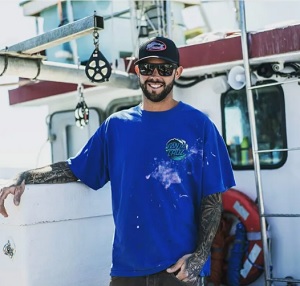
Local Dungeness crab fishermen oppose new fish and wildlife regulations
The regulations are a product of concerns surrounding how often whales and other endangered species are getting caught in the ropes used to fish crabs. The regulations were met with some resistance from the local fishing community. However, conservationists argue the rules will do more good than harm to wildlife. Tim Obert, a fisherman, strongly opposes,,, “You’re driving down the street and you accidentally run over a squirrel or maybe you hit a deer on a mountain road, it doesn’t mean you go park your car in the garage and never turn it on again or never leave your house,” he said. Ben Platt, the President of the California Coast Crab Association, also opposes the regulations,,, >click to read< 08:13

Punitive New Rules Will Crush CA Dungeness Crab Fishing Families, Threaten Holiday Crab Traditions
This week, the California Department of Fish and Wildlife (CDFW) put into effect onerous new regulations that among other things, could delay or close the state’s iconic crab fishery if whales are present near the crab grounds and could economically devastate our coastal communities that rely on the fishing and seafood industry. Called the Risk Assessment Mitigation Program (RAMP), these punitive rules also include triggers for crab fishery closures that are more restrictive than even the strictest fishery laws in the nation, the Marine Life Protection Act (MLPA) and the Endangered Species Act (ESA). “Regulators seem to be more concerned about the optics in the media of the rare occurrence of an entangled whale than the fact that the populations of these marine mammals, which migrate off our coast, are skyrocketing, and may soon be eligible for removal from the Endangered Species List,” said Ben Platt, president of the California Coast Crab Association (CCCA). >click to read< 10:02
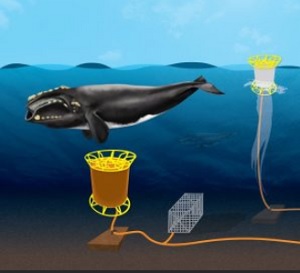
Everything you’ve heard about ‘ropeless’ fishing gear is false.
Is so-called “ropeless” fishing gear the magic bullet for the perceived problem of marine mammal interactions in California’s crab fisheries? (what about the New England lobster fishery?) Several profit-driven environmental groups, including Oceana, would like the public and the California Department of Fish and Wildlife (CDFW) to believe it is.,,, In truth, there have only been four mortalities attributed to CA commercial Dungeness crab gear since 2013, and none during the last two seasons.,,, Maine’s lobster fishery has never had a documented serious injury or mortality for any Right whale, and no entanglement since 2002, which makes this a non-problem. One of the problems with “ropeless” gear is that it’s a misleading term used by the profit-driven environmental groups to make it seem harmless. >click to read< 15:06
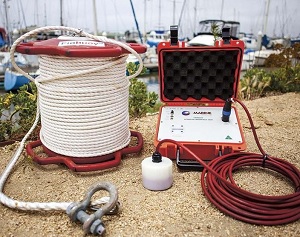
Ropeless gear is not the silver bullet – New technology promises to save the whales by reducing the need for crab fishing lines.
“We are working with fishermen to see what works and what doesn’t and what allows the fisherman to survive economically,” says Geoff Shester, a Monterey-based scientist with nonprofit Ocean. In June, the Ocean Protection Council awarded $500,000 for the testing of pop-up gear in the coming fishing season. The money will pay for five prototypes, including designs by Marina-based Desert Star Systems and Watsonville-based McFarlane Marine Services. The money will also go to fishermen participating in the research. A new crab industry group, California Coast Crab Association, is pushing back. Its president, Ben Platt, described the RAMP regulations as “an existential threat to our livelihoods”,,, >click to read< 08:39
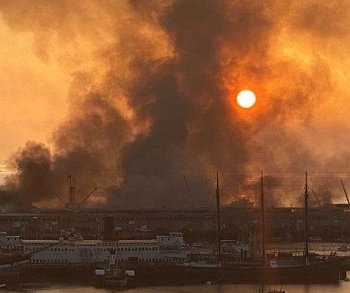
Fire Tears Through San Francisco’s Pier 45 Fishing Offices, Equipment at Fisherman’s Wharf
The four-alarm fire at San Francisco’s Pier 45 will put a real strain on the fish and crab industry that’s an important part of Fisherman’s Wharf. Several dozen fishing businesses are located on the rear of the pier, including offices, vehicles and equipment. Hundreds of thousands of crab pots were lost at a cost of more than $300 apiece, leading to a burned plastic smell in the area. The fishermen and crab fleet keeps most of their gear at Pier 45. “It’s a complete wipeout for the majority of the crab fleet there,” California Coast Crab Association President Ben Platt told KCBS Radio. >click to read or listen< 22:31
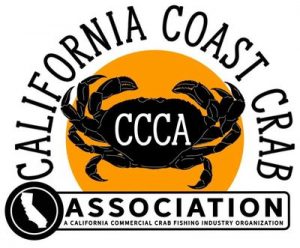
Dungeness Crab Season Closed Early Due to Dubious Whale Crisis, COVID-19 Economic Impact on Coastal Communities Made Worse by Closure
The California Department of Fish and Wildlife (CDFW) today announced that effective May 15, 2020, the commercial Dungeness crab fishing season, which began in December, will be closed due to the perceived risk of commercial crab fishing gear harming migratory whales. Ironically, as a result of ongoing cooperative measures between the California Dungeness crab fishing fleet and CDFW, interactions between Dungeness crab fishing gear and the two subgroups of Humpback whales, or Distinct Population Segments (DPS), which are “endangered” and “threatened” under the Endangered Species Act (ESA) are extremely rare. “The risk of crab fishing gear harming endangered whales is statistically insignificant because of low concentrations of whale, as well as the relatively small amounts of gear being deployed along the Central California coast,” said Ben Platt, president of the California Coast Crab Association (CCCA). >click to read< 12:26
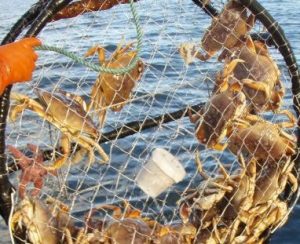
California crab fishery to close May 15th for whale protection
Commercial fishermen are protesting an order by California wildlife authorities to close the Dungeness crab fishery in mid-May to protect whales and sea turtles from becoming entangled in fishing gear. There have been no confirmed interactions between commercial Dungeness crab gear and any whales during the current crab season, which began in December, Ben Platt, president of the Crescent City-based California Coast Crab Association, said in a statement. The crab association statement characterized harm to migratory whales from commercial crab fishing gear as a “perceived risk.” The group said that cooperative measures between the fishing fleet and the state make it extremely rare for there to be interactions between Dungeness crab gear and subgroups of humpback whales that are categorized as endangered or threatened. >click to read< 18:24
 Dungeness Crab Season Closed Early Due to Dubious Whale Crisis, COVID-19 Economic Impact on Coastal Communities Made Worse by Closure – “The risk of crab fishing gear harming endangered whales is statistically insignificant because of low concentrations of whale, as well as the relatively small amounts of gear being deployed along the Central California coast,” said Ben Platt, president of the California Coast Crab Association (CCCA). >click to read<
Dungeness Crab Season Closed Early Due to Dubious Whale Crisis, COVID-19 Economic Impact on Coastal Communities Made Worse by Closure – “The risk of crab fishing gear harming endangered whales is statistically insignificant because of low concentrations of whale, as well as the relatively small amounts of gear being deployed along the Central California coast,” said Ben Platt, president of the California Coast Crab Association (CCCA). >click to read<
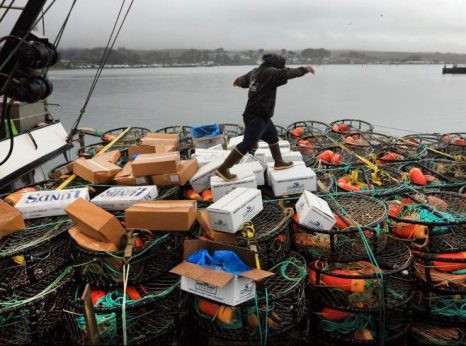
Dungeness crab season under way on the North Coast
The commercial crabbing season will start on time off the Sonoma Coast this fall for the first time in three years, putting fresh Dungeness crab in local markets by week’s end and restoring long-held autumn and holiday traditions. Commercial crabbers around Bodega Harbor hustled Monday to load boats with gear and bait and leave port in time to start soaking crab pots off the coast by early Tuesday morning. Their clocks were set for 6:01 a.m., the first moment by law at which they are permitted to put gear in the water. They can start pulling full pots and landing crab at 12:01 a.m. Wednesday, the official start of the season. click here to read the story 09:04
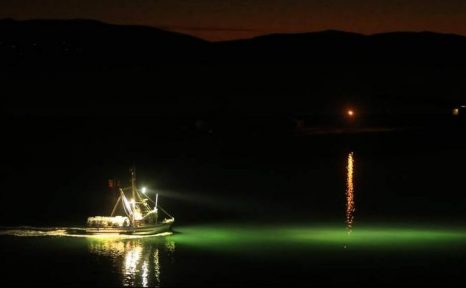
Bodega Bay boats set out for Dungeness crab along Sonoma Coast
The full force and focus of the West Coast crabbing fleet has turned on the waters off Sonoma County, where newly opened fishing grounds are expected to yield the next crop of holiday Dungeness crab. Local fishing vessels left docks in droves before dawn Friday to start setting traps in a fishery whose bounty has made the sweet, succulent crustaceans an important cash crop around the North Coast. Boats from around California, as well as Oregon and Washington, where the crab seasons have been delayed, have also joined in the latest opening, making for crowded, derby-style action that gives the advantage to the very biggest boats, crabbers say. “I’ve never seen this many boats and this much gear north of Point Reyes,” Windsor crabber Ben Platt said by phone Friday off the Sonoma Coast as he deployed traps earlier set in Half Moon Bay, where he started the season. 11 great images, read the story here 08:30
A Fisherman’s Perspective: Catch Shares – Support HR 1335

EDF’s campaign to implement catch shares in our nation’s fisheries is not only misguided, but it is a serious threat to the livelihoods of the majority of American fishermen. Fishermen beware: you are gazing directly into the friendly eyes of a lion in sheep’s clothing! This is one of those panacea, cure-all fixes for fisheries management which NGO’s love to promote because they are easy sells to the legions of non-fishing folks who are easily convinced that something needs to be saved because EDF tells them so and they don’t have enough other information to know any better. Read the rest here 13:22






